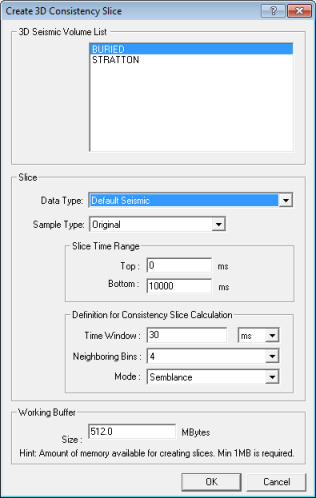Open topic with navigation
Create
3D Consistency Slice Files
 View image
View image

 How to open this dialog box
How to open this dialog box
From the menu bar select to open the Create 3D Consistency Slice dialog box.
About Consistency Slices
Consistency slices are a statistical
measure of the trace-to-trace similarity. They are useful in examining
fault edges, locating anomalies, or identifying data problems. When WinPICS performs a consistency calculation,
it sums up the products of semblance over the entire time gate, normalizes
the sum, and then identifies that value as the consistency of the middle
of the analysis window. Then WinPICS
moves down one sample and performs the calculation again.
Consistency slices may be calculated on the fly
from an existing amplitude slice file
to save disk space or posted from a pre-computed consistency slice file
to save posting time. This section describes how to create the consistency
slice file. See also Creating
Amplitude Slice Files.
Create Consistency Slices
Follow these steps:
- In the 3D Seismic Volume List, select the 3D seismic you wish to include.
- Select the Data
Type. The default data type is your current version, which is the
3D seismic file with the largest extension number. You may select a different
version of your 3D file or an instantaneous attribute file.
- Set the Sample Type as Original,
16-bit Int, or 8-bit Int for the output slice file. If the hard disk space
is at a premium, select 8-bit Int.
- Specify a top and a bottom
time range in milliseconds under Slice Time Range.
You can slice the entire volume or select smaller subsets to save time
and disk space. Ranges of data can be added to existing slice files later
(see Adding to Existing Slice
Files).
- The time window is the temporal parameter of a
consistency slice. Type a value for the Time Window and select milliseconds or microseconds. This setting
depends on the resolution of your data. 10 ms is the default and is a
good value for data sampled at 2 ms.
- The neighboring bins determine the spatial parameter
of the consistency slice. Select a number of Neighboring Bins over which
the comparison is run. This setting depends upon the trace-to-trace variability
of your data and available memory.
- Type a value for the working buffer.
- Click <OK>to begin calculation or click <Cancel>to exit window.
What do you want to do?
 View image
View image